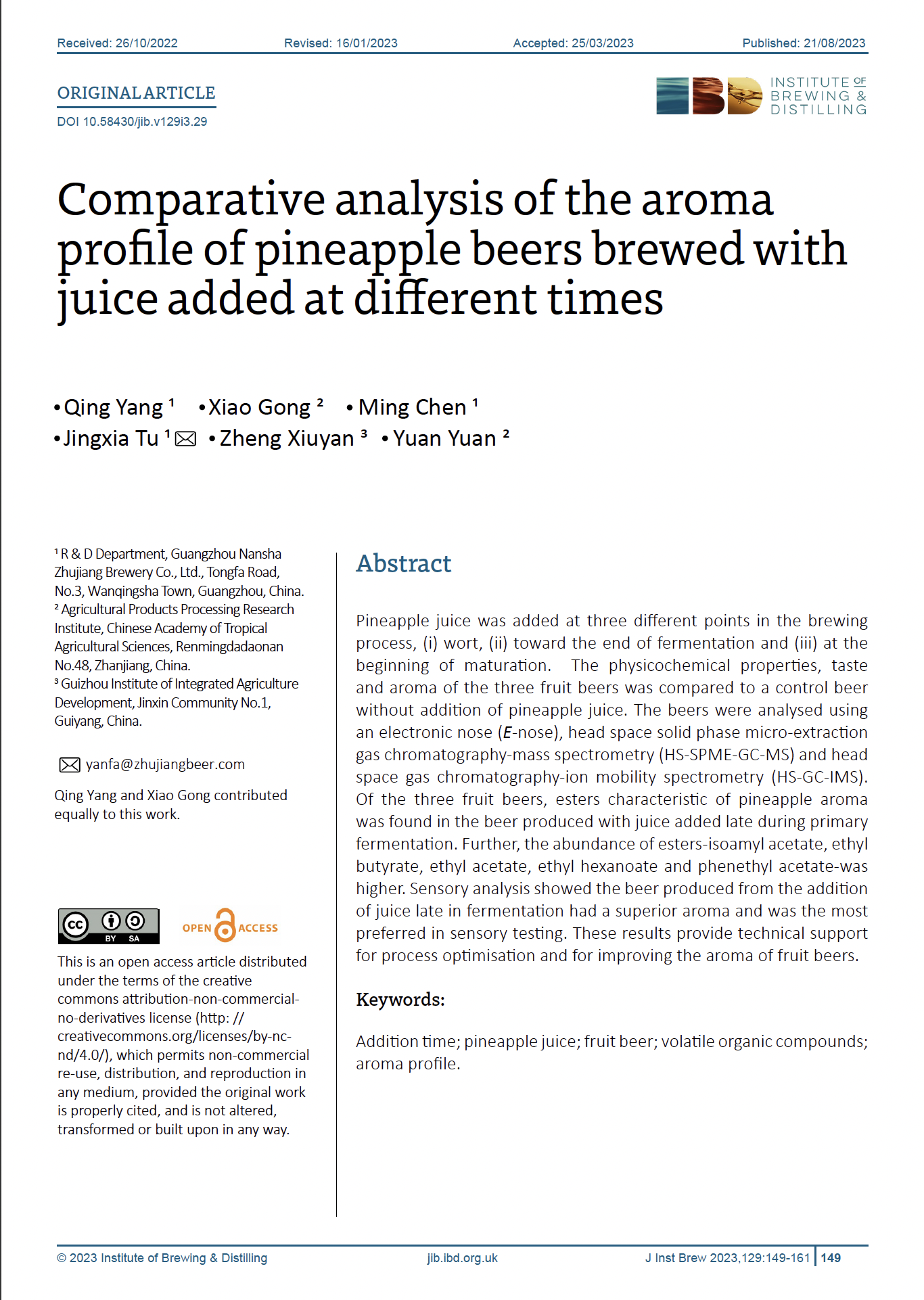Comparative analysis of the aroma profile of pineapple beers brewed with juice added at different times
DOI:
https://doi.org/10.58430/jib.v129i3.29Keywords:
time of addition, pineapple juice, fruit beer, volatile organic compoundsAbstract
Pineapple juice was added at three different points in the brewing process, (i) wort, (ii) toward the end of fermentation and (iii) at the beginning of maturation. The physicochemical properties, taste and aroma of the three fruit beers was compared to a control beer without addition of pineapple juice. The beers analysed using an electronic nose (E-nose), headspace solid phase micro-extraction gas chromatography-mass spectrometry (HS-SPME-GC-MS) and headspace gas chromatography-ion mobility spectrometry (HS-GC-IMS). Of the three fruit beers, esters characteristic of pineapple aroma was found in the beer produced with juice added late during primary fermentation. Further, the abundance of esters - isoamyl acetate, ethyl butyrate, ethyl acetate, ethyl hexanoate and phenethyl acetate - was higher. Sensory analysis showed the beer produced from the addition of juice late in fermentation had a superior aroma and was the most preferred in sensory testing. These results provide technical support for process optimisation and for improving the aroma of fruit beers.
Downloads
References
Alves V, Gonalves J, Figueira JA, Ornelas LP, Branco RN, Câmara JS, Pereira JAM. 2020. Beer volatile fingerprinting at different brewing steps. Food Chem 326:126856. DOI: https://doi.org/10.1016/j.foodchem.2020.126856
Antalick G, Perello MC, Revel G. 2010. Development, validation and application of a specific method for the quantitative determination of wine esters by headspace-solid-phase microextraction-gas chromatography-mass spectrometry. Food Chem 121:1236-1245. DOI: https://doi.org/10.1016/j.foodchem.2010.01.011
Baigts-Allende DK, Pérez-Alva A, Ramírez-Rodrigues MA, Palacios A, Rodrigues MMA. 2021. A comparative study of polyphenolic and amino acid profiles of commercial fruit beers. J Food Compos Anal 100:103921. DOI: https://doi.org/10.1016/j.jfca.2021.103921
Carvalho GBM, Silva DP, Bento CV, Vicente AA, Teixeira JA, Felipe MGA, Almeida e Silva JB. 2009. Banana as adjunct in beer production: applicability and performance of fermentative parameters. Appl Biochem Biotec 155:356-365. DOI: https://doi.org/10.1007/s12010-008-8458-y
Chen QQ, Song JX, Bi JF, Meng XJ, Wu XY. 2018. Characterization of volatile profile from ten different varieties of Chinese jujubes by HS-SPME/GC-MS coupled with E-nose. Food Res Int 105:605-615. DOI: https://doi.org/10.1016/j.foodres.2017.11.054
Christoph N, Bauer-Christoph C. 2007. Flavour of spirit drinks: Raw materials, fermentation, distillation, and ageing. In R. G. Berger (Ed.). Flavours and Fragrances: Chemistry, bioprocessing and sustainability (pp. 219-239). Berlin: Springer DOI: https://doi.org/10.1007/978-3-540-49339-6_10
da Silva Santos MA, Lima Ribeiro PV, Pereira Andrade C, Machado ARG, de Souza PG, de Souza Kirsch L. 2021. Physicochemical and sensory analysis of craft beer made with soursop (Annona muricata L.). Acta Sci. Pol. Technol. Aliment 20:103-112. DOI: https://doi.org/10.17306/J.AFS.2021.0845
Ducruet J, Rébénaque P, Diserens S, Kosinska-Cagnazzo A, Héritier I, Andlauer W. 2017. Amber ale beer enriched with goji berries-The effect on bioactive compound content and sensorial properties. Food Chem 226:109-118. DOI: https://doi.org/10.1016/j.foodchem.2017.01.047
Gasiński A, Kawa-Rygielska J, Szumny A, Czubaszek A, Gąsior J, Pietrzak W. 2020. Volatile compounds content, physicochemical parameters, and antioxidant activity of beers with addition of mango fruit (Mangifera Indica). Molecules 25:3033. DOI: https://doi.org/10.3390/molecules25133033
Gong X, Yang Q, Chen M, Tu JX. 2022. Characterization of antioxidant activities and volatile profiles of pineapple beer during the brewing process. J Food Nutr Res 61:116-128
Gorzelany J, Michałowska D, Pluta S, Kapusta I, Belcar J. 2022. Effect of ozone-treated or untreated saskatoon fruits (Amelanchier alnifolia Nutt.) applied as an additive on the quality and antioxidant activity of fruit beers. Molecules 27:1976. DOI: https://doi.org/10.3390/molecules27061976
Holt S, Miks MH, de Carvalho BT, Foulquié-Moreno MR, Thevelein JM. 2019. The molecular biology of fruity and floral aromas in beer and other alcoholic beverages. FEMS Microbiol Rev 43:193-222. DOI: https://doi.org/10.1093/femsre/fuy041
Kawa-Rygielska J, Adamenko K, Kucharska AZ, Prorok P, Piórecki N. 2019. Physicochemical and antioxidative properties of Cornelian cherry beer. Food Chem 281:147-153. DOI: https://doi.org/10.1016/j.foodchem.2018.12.093
Nardini M, Garaguso I. 2020. Characterization of bioactive compounds and antioxidant activity of fruit beers. Food Chem 305:125437. DOI: https://doi.org/10.1016/j.foodchem.2019.125437
Park YC, Shaffer CE, Bennett GN. 2009. Microbial formation of esters. Appl Microbiol Biot 85:13-25. DOI: https://doi.org/10.1007/s00253-009-2170-x
Segura-Borrego MP, Martín-Gómez A, Ríos-Reina R, Cardador MJ, Morales ML, Arce L, Callejón RM. 2022. A non-destructive sampling method for food authentication using gas chromatography coupled to mass spectrometry or ion mobility spectrometry. Food Chem 373:131540. DOI: https://doi.org/10.1016/j.foodchem.2021.131540
Surburg H, Panten J. 2016. Common Fragrance and Flavour Materials: Preparation, Properties and Uses. 6th ed. Weinheim: Wiley-VCH DOI: https://doi.org/10.1002/9783527693153
Takeoka G, Buttery RG, Flath RA, Teranishi R, Wheeleer EL, Weiczorec RL, Guentert M. 1989. Volatile constituents of pineapple (Ananas comosus [L.] Merr.). In Flavour Chemistry: Trends and Developments; Teranishi R, Buttery RG, Shahidi F, Eds.; ACS Symposium Series 388. American Chemical Society: Washington, DC, USA, pp. 221-237 DOI: https://doi.org/10.1021/bk-1989-0388.ch018
Wei CB, Liu SH, Liu YG, Lv LL, Yang WX, Sun GM. 2011. Characteristic aroma compounds from different pineapple parts. Molecules 16:5104-5112. DOI: https://doi.org/10.3390/molecules16065104
Yang Q, Tu JX, Chen M, Gong X. 2022. Discrimination of fruit beer based on fingerprints by static headspace-gas chromatography-ion mobility spectrometry. J Am Soc Brew Chem 80:298-304. DOI: https://doi.org/10.1080/03610470.2021.1946654
Yin H, Deng Y, Zhao J, Zhang LH, Yu JH, Deng Y. 2021. Improving oxidative stability and sensory properties of ale beer by enrichment with dried red raspberries (Rubus idaeus L.). J Am Soc Brew Chem 79:370-377. DOI: https://doi.org/10.1080/03610470.2020.1864801
Zhang GY, Abdulla W. 2022. On honey authentication and adulterant detection techniques. Food Control 138:108992. DOI: https://doi.org/10.1016/j.foodcont.2022.108992
Zhu GY, Yu GF. 2020. A pineapple flavour imitation by the note method. Food Sci Technol (Campinas) 40:924-928. DOI: https://doi.org/10.1590/fst.26019

Downloads
Published
How to Cite
Issue
Section
License
Copyright (c) 2023 Journal of the Institute of Brewing

This work is licensed under a Creative Commons Attribution-NonCommercial-NoDerivatives 4.0 International License.
This is an open access article which permits non-commercial re-use, distribution, and reproduction in any medium, provided the original work is properly cited, and is not altered, transformed or built upon in any way.
Permission will be required if the proposed reuse is not covered by the terms of the License. In this event, email the Editor in Chief - david.quain@ibd.org.uk - with details of your request.








